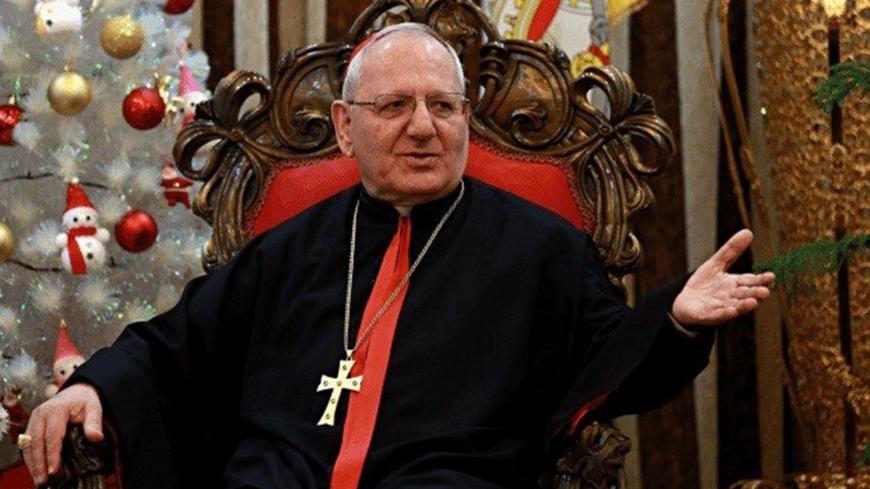The Chaldean Catholic Church headed by Cardinal Louis Raphael I Sako is trying to play an important role in politics that resembles the role of the senior Shiite cleric, Grand Ayatollah Ali al-Sistani. Although this role is not direct intervention in politics but only an advisory role that provides support to certain political issues, it triggered the reactions of Christian political parties that want to have the only say in decisions related to the Christian community. They want to be entirely separate from the religious institution in the country.
The latest development in the ongoing debate between the church and the Christian parties is the refusal of the five members of parliament of the Christian bloc to support the candidacy of church-backed Hanaa Korkis as minister of displacement and migration. Due to the Christian bloc's opposition, Korkis did not receive the parliament’s confidence vote, and she also did not receive the support of Christian allies in parliament such as the Al-Binaa Alliance.
The Ministry of Displacement and Migration is traditionally allocated to Iraq's Christian community. Yet the Christian members of parliament insist on having the sole say in the candidacy. They issued a statement Dec. 4 expressing their opposition to the candidacy of Korkis, arguing that she does not represent them and insisting that her candidacy is an attempt to isolate their role in parliament.
Also, the Christian Babylon movement, which is close to the Popular Mobilization Units, said in a statement that its leadership and the members of the Christian parliamentary bloc “strongly oppose the candidacy of Korkis for the position of minister of displacement and migration.” The movement said it is “necessary for the candidate to be named by the representatives of the Iraqi people in parliament.”
The statement said, “Assigning someone for the ministry is a political process, not a religious one. Prime Minister Adel Abdul Mahdi has to respect the decision of the Christian bloc. If he chooses someone, that person (must be chosen after talks and) should not be aggressively imposed on the bloc.”
In response to the Christian parties’ criticism of the church, the Chaldean Patriarchate issued a statement Dec. 17 saying, “The church is not trying to replace or equate itself with the government.” The patriarchate criticized “partisan Christian elements” for their irresponsible and provocative comments regarding the interference of the church in the political realm. The statement said, “The church is concerned with the public good. This is part of its vocation as it has a mission to support the well-being of people protecting their rights and dignity. By doing so, it mimics the roles of Jesus Christ and the popes.”
The statement spoke of the example of the Catholic Church in the Vatican and its support of Patriarch Sako’s religious role in the country, saying, “The church is defending the rights of Palestinians. Pope John Paul II even played a role when Iraq was under siege, just as Pope Francis visited Burma and defended Muslims. “
The statement added, “The church is involved in matters of the public because it is part of its mission, not because it is seeking benefits. It is only concerned with people’s happiness and their development; however, it definitely does not want them to go back to dark times and the Inquisition like some figures said.”
The statement said, “By discussing public matters related to the country and its people, the Patriarchate represented by Cardinal Louis Raphael I Sako is not looking for any personal gains or benefits.”
The statement also pointed out that the church had previously backed candidates who became government ministers. “The Patriarchate supported the candidate from the communist party, former minister Fares Jajo, and Dr. Anne Nafi, an independent Syriac Christian, for her integrity, professionalism, and loyalty. Both were not named by the Christian bloc members of parliament.” Jajo served as minister of science and technology from 2014 to 2015 until the ministry was abolished; Nafi was minister of construction and housing from 2016 until October of this year.
The statement also said, “The church does not interfere in the political and partisan polarization and is far from it. Yet when asked about its opinion, it expresses it independently and responsibly. The church has the right to take legal action against anyone who tarnishes its reputation. It is determined to serve Iraq and the Iraqis no matter the cost.”
Despite the opposition of most Christian parties to Sako’s political role, a leader of the Christian Rafidain bloc, Yonadem Kanna, defended the patriarch, saying, “PM Abdul Mahdi and President Barham Salih decided to take two candidates from Cardinal Sako, who nominated Hanaa — the candidate of the Chaldean religious authority.”
Kanna, responding to the question of church interference in politics, said, “This is the general situation in the country. There are Islamic religious parties that constitute the majority, and as they respect Islamic religious authorities, we respect Christian religious authorities.”
However, Kanna and Emmanuel Khoshaba, the head of the Rafidain bloc, do not see eye to eye. Khoshaba said in a Dec. 19 statement that the parliament’s dismissal of Korkis “is a victory for the notion of a secular state and separation of religion from politics.” He said clerics imposed Korkis and that she does not represent the thinking of the parliamentary component.
The Chaldean Patriarchate answered Khoshaba’s statements, saying, “These statements are delusional and not well-informed. We respect democratic choices, depending on their circumstances. A secular or religious state does not depend on dismissing an independent and technocratic woman (Hanaa) from the race.”
Apparently, the weakness of the political process and lack of institutionalization of political behavior in Iraq are forcing the different religious authorities representing diverse Iraqi components to voice their opinions when it comes to politics. Political parties consider such intervention to be competition with their role, and they are calling on religious authorities to implement a strict version of state secularism, which does not seem possible or applicable in Iraq.






